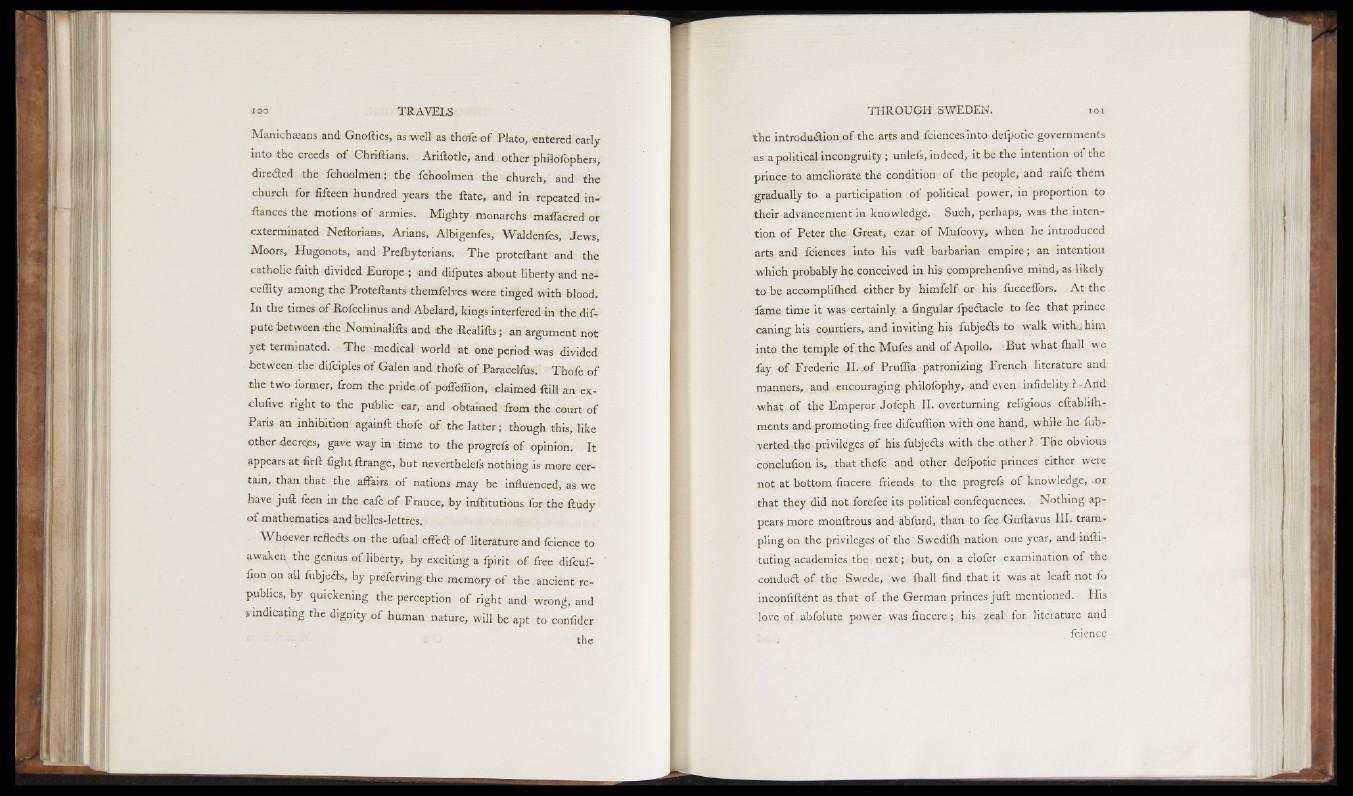
Manichasans and Onoitics, as v e l 1 as thoie o f 'Plato, entered early
into the creeds o f Chriftiaris. Ariftotle, and other philofophers,
directed the fohaolmen; the ichoolmen the church, and the
church for fifteen hundred years the Rate, and in repeated inftances
the motions o f armies. Mighty monarchs maffacred or
exterminated Neftorians, Arlans, Albigenfes, Waldenfes, Jews,
Moors, Hugonots, and Prefbyterians. T he proteftant and the
catholic faith divided Europe ; and difputes about liberty and ne-
cefiity among the Proteftants themfelves were tinged with blood.
In the times o f Roicelinus and" Abelard, kings interfered in the dif-
pute between .the Nominalifts and the Realifts; an argument not
yet terminated. T h e medical world a t one period was divided
between the difciples o f Galen and thofe o f ParaeeMus. Thofe o f
the two former, from the pride o f poffeflion, claimed ftill an ex-
clufive right to the public ear, and obtained from the court o f
Paris an inhibition againft thofe erf the latter ; though this, like
other,decrees, gave way in time to the progrefs o f opinion, ft
appears a t firft fight ftrange, but neverthelefs nothing is more certain,
than that the affairs o f nations may be influenced, as we
have juft feen in the cafe o f France, by inftitutions for the ftudy
o f mathematics and belles-lettres.
Whoever reflects on the ufual effeil o f literature and Icience to
awaken the genius o f liberty, by exciting a ipirit o f free difcuf- '
fion on all fubjefts, by preferving the memory o f the ancient republics,
by quickening the perception o f right and wrong, and
»indicating the dignity o f human nature, will be apt to confider
the
the introduction o f the arts and fciences into defpotic governments
as a political incongruity; unlels, indeed, it be the intention o f the
prince to ameliorate the condition o f the people, and raife them
gradually to a participation o f political power, in proportion to
their advancement in knowledge. Such, perhaps, was the intention
o f Peter the Great, czar o f Mufcovy, when he introduced
arts and fciences into his vaft barbarian empire; an intention
which probably he conceived in his comprehenfive mind, as likely
to be accompliihed either by himfelf or his fucceffors. A t the
fame time it was certainly a fingular fpeitacle to fee that prince
caning his courtiers, and inviting his fubjeits to walk w ith , him
into the temple o f the Mufes and o f Apollo. But what ihall we
fay o f Frederic II.-of Pruflia patronizing French literature and
manners, andencouraging philofophy, and even infidelity ? .And
what o f the Emperor Jofeph II. overturning religious eftabliih-
ments and promoting free difcuflion with one hand, while he fub-
verted.tbs privileges o f his fubjeits with the other? T he obvious
conclufion is, that thefe and other defpotic princes either were
not at bottom fincere friends to the progrefs o f knowledge, or
that they did not forefee its political confequences. Nothing appears
more monftrous and abfurd, than to fee Guftavus III. trampling
on the privileges o f the Swediih nation one year, and infti-
tuting academies the n ex t; but, on a cloier examination o f the
conduit o f the Swede, we ihall find that it was at leaft not fo
inconfiftent as that o f the German princes juft mentioned. His
love o f abfolute power was fincere; his zeal for. literature and
fcience